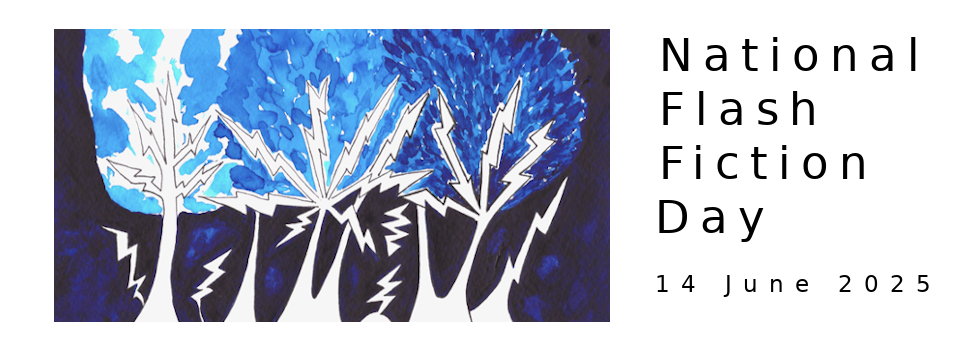Welcome to the last in our series of interviews with this year's National Flash Fiction Day Anthology editors and Microfiction Competition judges. This week, Diane Simmons chats with Alison Woodhouse, one of this year's judges for the 2021 NFFD Microfiction Competition, about novels, novellas-in-flash, favourite writers, and her advice to those entering this year's microfiction competition....
Diane: You won the NFFD micro fiction competition in 2019 and were Highly Commended in the 2020 competition. As a judge this year, is there any advice you can give to entrants to this year’s micro fiction competition?
Alison: Writing micros is (and should be) challenging! You’ve got to get a narrative arc and emotional shift into so few words. I usually start with an image or a phrase and work from there to get the first draft and then I do a lot of rewriting. As you go through your drafts you might write ones that are significantly longer or change the point of view, or where you begin and end. My advice is to track changes or print out versions. Sometimes, and I know I’ve done it, with all the editing and counting words you extinguish the spark, so make sure you can go back and find it. Another thing, and lots of people say this, read it aloud. You’ll hear any words that are out of place. If you can get a couple of people to read it before you submit, that’s also a good idea. If they both point out a problem, they’re probably right.
Diane: Your novella-in flash, The House on the Corner, was recently published by Ad Hoc Fiction after being Highly Commended in the Bath Flash Fiction Award’s competition. Can you tell us a little about the novella and the process of writing it?
Alison: The House on the Corner is about family, love, longing for connection, nostalgia, regret, all the cheerful things! The Kings (Helen and Martin and their children, Joe and Natalie) move into a new house, full of hope for the future. I set it in the 1980’s and early ‘90’s and used specific historical events as a backdrop, such as the Berlin Wall coming down and the Lockerbie disaster. I wrote it very quickly for the competition. I had some time afterwards to edit although I didn’t change much, just added a few more stories where I felt there were gaps and rewrote the ending. It was such an intuitive book to write. I originally thought of the house as a character and a succession of families moving in and I still wonder about doing a continuation. Before I wrote this, I’d been working on a novel (I had about 60,000 words) that had similar ideas, but just felt very stodgy. It was an absolute joy to write in this far lighter, more flexible and exciting form.
Diane: I know you are an avid reader. Do you retreat into reading for long spells or are you someone who always has a book on the go and steadily reads a little every day?
Alison: I’ve hardly read any novels recently. I’m not sure why. Maybe because I look at my phone too much! When I do read, I get totally absorbed and everything else falls by the wayside so no, I’m not a steady little bit everyday kind of reader. I’m really not very patient. I do like a short novel! One of the advantages of the phone or Ipad is I read a lot of short stories and flash ‘on the go’. The disadvantage is I tend to read them quickly then move on, whereas when the story is in a collection I linger over it, or go back and reread. Every now and again I’ll do a reading journal, which I find very useful. I’ll jot down thoughts about what I’m reading, what I’m learning from it as a writer, what I think works or doesn’t. I’m quite critical!
Diane: Can you remember where you first heard about flash? Do you remember any early flashes you read that left an impression on you?
Alison: My very first exposure would have been before I knew it was called flash! Tania Hershman’s The White Road was the first collection I bought and I thought it absolutely wonderful and then loved My Mother was an Upright Piano and Vanessa Gebbie’s Storm Warning. I knew I liked the idea of writing short, shorter, shortest, but didn’t think it something I could ‘do’. Then I moved to Bath in 2016 and met you, Diane, and you were writing a Nif and I had no idea what that was but from then on I didn’t look back!
Diane: What books or authors have most influenced your own writing?
Alison: That’s so hard to answer because different books have meant so much to me at different times and there are many that affected me deeply both as a reader and writer when I was, say in my early twenties, that I probably couldn’t read again now. However, sometimes you come across that thing in a story or a novel you can just sense, when it’s telling a truth and you feel it deeply in way that goes beyond analysing, that isn’t to do with structure or language or technique but uses all of those things - that’s the writing that makes me want to strive to be a writer who can do that, using just these clumsy words, because it’s a miracle isn’t it! I felt that reading Conrad’s Lord Jim a million years ago, even though it’s a terribly written book in some ways. I couldn’t get the idea of it out of my head, this devastating moment of self-realisation, that you’re not the person you’ve always believed you were, and what that does to you? How do you live? More recently I found it in Danielle Mclaughlin’s Sunday Times Short Story prizewinner, A Partial List of the Saved. I had to read it over and over and I’ll never forget it. I felt it with Cynan Jones’s The Dig and Marilyn Robinson’s Home. Writers construct a mirage, a lie if you like, to convey a truth and every now and again you only see or feel the truth, not the scaffolding around it. It’s a quality in the work, and it’s entirely personal, but when I read it, I know it and it makes me want to be a better writer.
 Alison Woodhouse is a writer and teacher. Her flash fiction and short stories have been widely published and anthologised, including In the Kitchen (Dahlia Press), With One Eyes on the Cows (Bath flash fiction), Leicester Writes 2018 & 2020 (Dahlia Press), The Real Jazz Baby (Reflex), A Girl’s Guide go Fishing (Reflex), National Flash Fiction Day Anthologies and Life on the Margins (Scottish Arts Trust Story Awards). She has won a number of story competitions including Flash 500, Hastings, HISSAC (flash & short story), NFFD micro, Biffy50, Farnham, Adhoc and Limnisa and been placed in many others. In 2019 she was awarded an MA with Distinction in Creative Writing from Bath Spa University. Her debut novella-in-flash The House on the Corner is published by AdHoc Fiction. Contact her at:
Alison Woodhouse is a writer and teacher. Her flash fiction and short stories have been widely published and anthologised, including In the Kitchen (Dahlia Press), With One Eyes on the Cows (Bath flash fiction), Leicester Writes 2018 & 2020 (Dahlia Press), The Real Jazz Baby (Reflex), A Girl’s Guide go Fishing (Reflex), National Flash Fiction Day Anthologies and Life on the Margins (Scottish Arts Trust Story Awards). She has won a number of story competitions including Flash 500, Hastings, HISSAC (flash & short story), NFFD micro, Biffy50, Farnham, Adhoc and Limnisa and been placed in many others. In 2019 she was awarded an MA with Distinction in Creative Writing from Bath Spa University. Her debut novella-in-flash The House on the Corner is published by AdHoc Fiction. Contact her at:
alisonwoodhouse.com
Twitter: @AJWoodhouse
Facebook: Alison Woodhouse
SUBMISSIONS ARE NOW OPEN for this year's National Flash Fiction Day Anthology and Micro Fiction Competition. Submissions close on 15th February 2021. For more information, please visit our Anthology and Competition guidelines.

